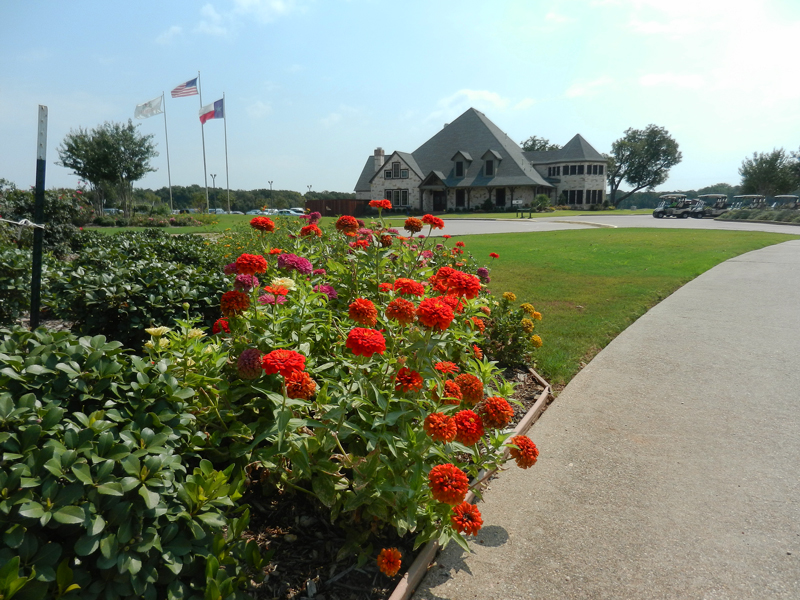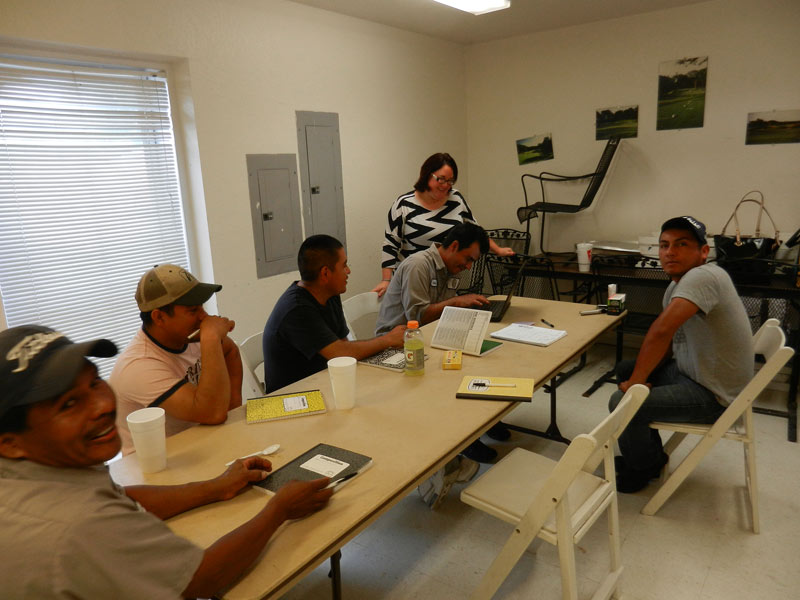
Located about 12 miles south of Fort Worth, Texas, Southern Oaks Golf Club opened in 1999, and its 18-hole design winds through oak and pecan trees and across a creek. Photos courtesy of Jorge Croda
The workplace environment for superintendents is vastly different today than it was just 10 years ago. According to the U.S. Bureau of Labor Statistics, Hispanics now represent more than one-third of the workforce in the landscape industry, and 16 percent of the entire U.S. workforce. In this changing climate, management practices that worked in the past may not necessarily work as well today.
Acknowledging and taking steps to understand the cultural differences among members of your crew can improve relationships and productivity, which can in turn positively impact your business. By investing time in learning about different cultures, we also broaden our perspective and strengthen our ability to connect with others, both of which allow us to be more effective leaders.
The golf course maintenance crew here at Southern Oaks Golf Club in Burleson, Texas, consists of 10 full-time employees, all of whom are Hispanic. Being of Hispanic descent myself, and having immigrated to the United States to create a better life for my family, I know firsthand the positive results that respecting and learning about other cultures brings to the workplace. My observations in this article are generalizations, and there are, of course, exceptions among people within any culture. While I focus on Hispanic culture, the same principles of thoughtfulness and being open to diverse worldviews apply to working with people of any heritage different from one’s own.
Through a different lens
Work ethic, respect and resourcefulness are dominant characteristics of Hispanic immigrant workers. Many cultures share these ideals, but it’s the culturally driven nuances behind the traits that can set Hispanic workers apart from workers of other backgrounds.
Hispanic immigrants who come to the United States are optimistic about building a better life for their families, and creating that better life begins with securing employment. Their work ethic is fueled by the importance they place on having the opportunity to pursue the American dream. Working conditions and wages in the U.S. are considerably superior to those in some other countries, and Hispanic immigrants want to excel in their jobs in order to remain in a position to stay in the United States and provide for their families.
Hispanic immigrants tend to value stability and long-term gains over short-term gains, meaning they prefer to continue in a position and work their way up rather than bouncing from job to job in search of a higher wage. Find ways to develop in your employees a sense of pride and ownership in the tasks they perform, and that effort will go a long way in establishing their loyalty to your company.

Francisco (left), a two-year crew member, and Bernardo, who has worked at Southern Oaks for four years, aerify the ninth green on the Mark Brooks-designed course.
Respect is central to Hispanic culture. Hispanic immigrants have an ingrained respect for authority, whether that’s their supervisors, teachers or law enforcement. If you gain a worker’s trust, you will have a dedicated employee who will go above and beyond to get the job done. The same respect is expected in return, and the inability to earn the trust of an employee could result in a worker who isn’t as productive as possible.
One way I try to show respect to my crew is by having monthly carne asada lunches. I chose carne asada after talking with my crew members about where they’re from and their favorite foods. In addition to fostering camaraderie and showing appreciation for hard work and dedication, I wanted the meals to be an acknowledgment of their unique culture.
Resourcefulness is another key characteristic of Hispanic immigrants. Many come from countries that do not have a variety of materials or tools available, and their resourcefulness stems from having to get a job done regardless of what may or may not be on hand. If members of my crew can draw from this aspect of their culture to find a more efficient way to do something, I encourage them to apply that creativity.
Finally, similar to their emphasis on work ethic and respect, Hispanic immigrant workers value teamwork, and they will pick up the slack when needed to ensure a task gets done. You can enhance this trait by leading by example, and by focusing on being a leader rather than just a boss.
I also make sure my employees know our department’s vision: “To provide a challenging and enjoyable course and an environment where guests of all golf levels can create memorable experiences.” Clear awareness of what we want to accomplish and why we do the things we do makes us one unit working toward a common goal.
A philosophy of betterment, gratitude
We have weekly maintenance department meetings to discuss management announcements, feedback from members and guests, and tasks that need attention or improvement and how we can go about accomplishing them. Meetings provide an opportunity to give out congratulations for hard work, and for employees to voice comments. The gatherings are also a structured reminder of the vision we have for the golf course, as well as of the five core rules that govern our department: Be safe; be kind to others; give each task your best; if you make a mistake, tell someone; and have fun.
An objective of mine as a supervisor and leader is to foster skills that will benefit my employees in both their professional and personal lives. At Southern Oaks, maintenance crew members have the opportunity to acquire skills beyond just their job-specific duties. The club offers on-site English classes for those looking to learn or become more fluent, and employees can also take computer classes and cross-train in other tasks around the course. All of this translates to employees who are more versatile.

Southern Oaks crew members attend English classes on Saturday or Sunday mornings for the last hour of their shift.
In addition to these concrete skills, I also focus on developing my crew members’ interpersonal skills, such as how to communicate effectively with co-workers and how to properly introduce oneself when meeting someone new. We work on intrapersonal skills as well, which include things such as setting goals and understanding and managing emotions. I also strive to instill resiliency skills in my employees — strategies for adapting to change and overcoming challenges. I see all of this as an investment in developing a company’s greatest asset: its employees. A well-treated staff will be happier, of course, and their satisfaction will likely make them more motivated and more inclined to remain with a company.
A further step in boosting employee morale is to create a culture of gratitude within your department. Encourage your employees to celebrate each other, whether it’s through some type of structured recognition program where they can praise co-workers for specific qualities or achievements, or through a more anonymous approach, perhaps where employees leave notes of thanks to each other in a designated location.
Another tactic is to show appreciation for your entire team at once through a special event or activity. Along with our monthly carne asada lunches, we’ve also held a staff scramble tournament. This was a fun team-building experience, and it allowed the crew to play golf on the course and see things from the members’ perspective.
Finally, make “thank you” a phrase heard daily. It’s so simple, but these words have a significant impact in making your employees — and people around you in general — feel valued.
High-profile praise
Last November, Southern Oaks was honored to receive a visit from Mexican consul general José Octavio Tripp. He is a golf enthusiast, and he had heard about the successful transformation Southern Oaks has undergone in recent years. For Mexican nationals living in the United States, having the opportunity to meet the Mexican consul general is an immense honor.
Mr. Tripp recognized the maintenance crew for their important contributions to the improvement of conditions at Southern Oaks, and thus to its ranking as a top golf course in North Texas. He also congratulated the maintenance department for its continued efforts in celebrating cultural diversity and building strong Hispanic role models, and said he hopes such work will help showcase Hispanic workers in Texas and throughout the United States.
Receiving accolades directly from the consul general was high praise, and having such an esteemed individual come to our course was a special acknowledgment of our team’s diversity and how it has made a positive impact on the business side of Southern Oaks. Kevin Long, executive director of The First Tee of Fort Worth, was able to join us for Tripp’s visit, which emphasized that bridging barriers — whether related to culture or age — is essential to our mission of growing the game of golf.
In my role as a superintendent, I am a leader, and my philosophy as a leader is to focus on teaching and demonstrating to employees values of teamwork, etiquette, good communication, hard work and dedication. Understanding and valuing the cultural differences among employees and how these translate into strengths for the team is one of the major pieces of this philosophy. As businessman Richard Branson said, “Train people well enough so they can leave; treat them well enough so they don’t want to.”
Jorge Croda is the GCSAA Class A superintendent at Southern Oaks Golf Club in Burleson, Texas, where he has worked since 2013. He is a nine-year member of GCSAA and serves as one of the association’s grassroots ambassadors, and is also a life and golf skills coach for The First Tee. Jorge lives in Fort Worth, Texas, with his wife, Linda, and has three children, Jimena, Jorge and Maria-José.